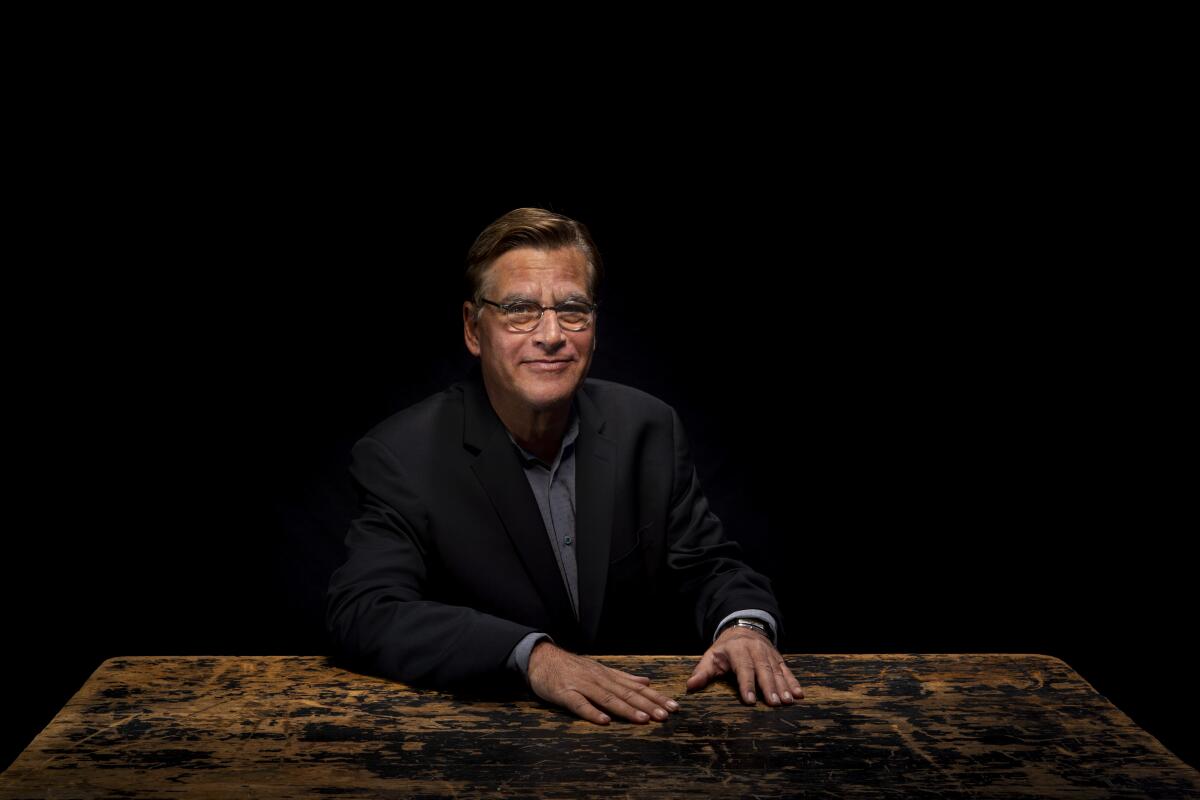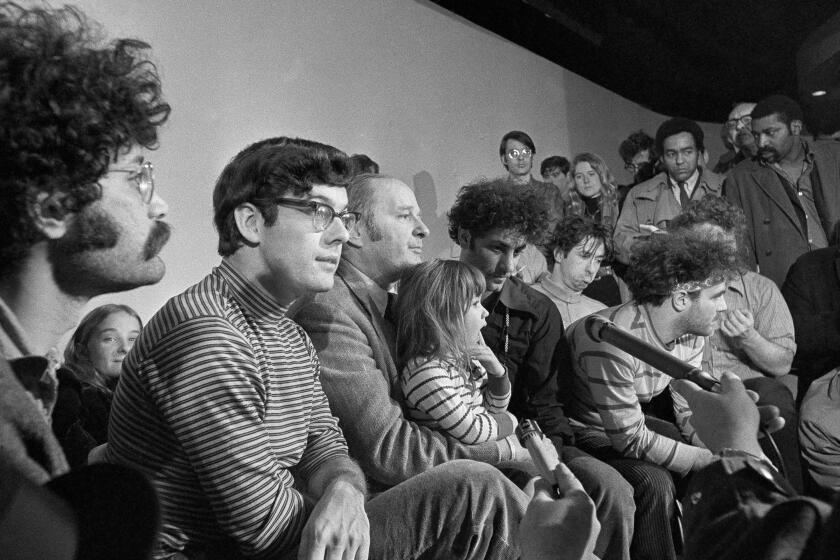What would Aaron Sorkin change about ‘Chicago 7’ if he could go back?

- Share via
In the early hours of March 15, when the Academy Award nominations were about to be announced, Aaron Sorkin, who wrote and directed the raucous legal drama “The Trial of the Chicago 7,” was leaving nothing to chance. Instead, he engaged in a ritual that began back when he learned he was up for an adapted screenplay Oscar for “The Social Network,” which he ultimately won. He put on the same watch and tucked into his pockets the items that had been there on that long-ago nominations morning in 2011, including a chain with a locket that was given to him the first time he was nominated for an Emmy in 1999 for “Sports Night.”
“It’s got a picture of my daughter, so I am leveraging my child,” says Sorkin, who has a naturally somber face but a wry sense of humor. “In this one area, I am really pathetically superstitious.” After a beat, he upgraded his quirk to a psychological condition. “It may be more than superstition. It may be OCD.”
A case can be made that Sorkin’s talismans did their job. “Chicago 7” racked up half a dozen Oscar nominations last week, including best picture, supporting actor for Sacha Baron Cohen, who plays yippie Abbie Hoffman in the film, and an original screenplay nod for Sorkin himself. But it didn’t result, as had been predicted by some, in a director nomination.
If the omission initially stung, he seems to have moved on. “I cannot find a way to be unhappy about only getting six nominations,” he says, speaking by Zoom from his home office in the Hollywood Hills. “I tried. And I couldn’t do it. There isn’t a single one of the five nominees for best director who doesn’t deserve to be there.”
Perhaps Sorkin can wax philosophical because of the film’s 14-year gestation period, one that involves the 2007-08 writers strike and a string of potential directors, beginning with Steven Spielberg, followed by Ben Stiller, Paul Greengrass, Gary Ross and Peter Berg. And that’s just a thin sliver of the “Chicago 7” origin story, one that begins in 2006, when Spielberg first invited Sorkin to his home in the Pacific Palisades and asked him to write a screenplay about the real-life saga of the anti-Vietnam War activists charged with conspiring to use interstate commerce with intent to incite a riot during the 1968 Chicago Democratic National Convention.
Five decades after the Chicago 7 trial, Aaron Sorkin writes about why it took 14 years and an Abbie Hoffman rethink to finish his Netflix movie.
Spielberg may have noticed that Sorkin was nodding and enthusing but probably didn’t realize how little his guest knew about the incident. “I was lucky to get through that meeting alive,” says Sorkin, who called his dad on the way home and got an earful about the politically motivated prosecution of Hoffman, Jerry Rubin, Tom Hayden, David Dellinger, Rennie Davis, John Froines and Lee Weiner. “Then I went through a pretty long period of research.”
In the end, Sorkin relied on “a dozen or so good books” about the trial, as well as a 21,000-page court transcript that became key source material.
“The real trial was crazier than what you saw in the movie,” Sorkin says of a bizarre proceeding that dragged on for five months. “Arlo Guthrie tried to sing all of ‘Alice’s Restaurant’ on the witness stand. Allen Ginsburg tried to recite all of ‘Howl.’ The wheels just came off the wagon.”
If the scorching exchanges in the film between contempt-spewing presiding judge Julius Hoffman (played by Frank Langella) and Black Panther Bobby Seale (Yahya Abdul-Mateen II), a codefendant whose case ended in mistrial, carry an extra shimmer of authenticity, there’s a reason. “I hate to be glib about it,” says Sorkin, “but those were right from the transcript.”
He says a turning point in his information-gathering had to do with meeting Hayden, who revealed something that Sorkin hadn’t come across in the transcript or any of the books — the simmering tension between Abbie Hoffman, who had a penchant for wild courtroom antics, and the more serious-minded Hayden. “You don’t want to just dramatize a Wikipedia page,” says Sorkin, who notes that learning of the friction between the two men helped him figure out the structure of the film. “I wanted to tell three stories at the same time. There was the courtroom drama, how a peaceful demonstration evolved into a violent clash, and the third was Tom and Abbie.”
He also learned how something Hayden said to protesters might have inadvertently turned a peaceful demonstration in Chicago’s Grant Park into an uprising. “O-u-r. He meant to say, ‘If our blood is going to spill, then let it flow all over the city,’ which is a very different implication from ’If blood is going to spill’ — and something I wouldn’t have been able to get from anyplace else than Tom.”
During the protracted development phase when “Chicago 7” toggled between a go picture and a moribund project, a familiar pattern formed. A promising director would sit down with a line producer, and as soon as they tried to budget the film’s two riot scenes, the deal would blow up. Meanwhile, Sorkin was continuously tinkering with the script, doing whatever he could think of to give it life. (“Don’t laugh,” says Sorkin, “but at one point I wanted to turn it into a musical.”)
In part, Sorkin owes getting “Chicago 7” to finally happen to the truly unlikely combination of his 2017 big-screen directorial debut, “Molly’s Game,” and how Donald Trump wound up MAGA crowds at his 2016 campaign rallies. “When Trump started running for president, there’d be a protester, and he’d get nostalgic for the old days,” says Sorkin. “He’d say, ‘Let’s beat the crap out of him,’ and Steven decided the time to make this movie was now. He was sufficiently pleased with ‘Molly’s Game’ and decided that I should direct ‘Chicago 7.’”
What about budgeting the protests? “He said, ‘Now the riots are your problem.’” By cross-cutting between newly shot material, archival clips and footage from Haskell Wexler’s 1969 “Medium Cool,” set at the same convention, Sorkin conveyed the riots within the estimated $35-million budget.
But having spent a decade plus buffing the screenplay to a high gloss, he was less inclined to accept help with the dialogue. “Aaron wanted to be collaborative, and I probably misunderstood [what that means],” says Baron Cohen, who, inspired by rare Hoffman interviews he was listening to, was constantly pitching added lines to Sorkin. “I’d say, ‘What about this line?’ and ‘He’s hilarious here,’ and Aaron was consistent in saying, ‘Thank you very much. But this is the script I’ve written.”
Outside of scripted-line fealty, however, the actors had wide berth. “I did quite a bit of clowning around,” says Jeremy Strong, who, to stay in character as prank-happy Rubin, routinely deployed buzzers and cowbells. Once, Strong played a practical joke involving Langella, the storied actor’s close-ups and a remote-controlled fart machine. “I got in hot water for that one,” admits Strong, who then adds, “I think lots of people have this idea that Aaron is very restrictive. But more than anything, he wants things to be truthful, and he’s not one to stifle an impulse.”
As with all of his screenplays, Sorkin has some after-the-fact tweaks he’d like to make to “Chicago 7.” “Scripts are never really finished. They’re just confiscated. Someone says it’s time to put pencils down,” he says, sounding wistful. “If I could go back and make a change, it would be this: [Defense attorney] Bill Kunstler became completely undone during this trial. To him, courtrooms were cathedrals, where you find justice, equality. None of that was happening, so Kunstler began drinking, getting high. It feels to me a lot like the way we’ve all felt for the last five years, that nothing was working. We’ve all been coming undone,” says Sorkin. “And that would have been a nice thing to add.”
More to Read
From the Oscars to the Emmys.
Get the Envelope newsletter for exclusive awards season coverage, behind-the-scenes stories from the Envelope podcast and columnist Glenn Whipp’s must-read analysis.
You may occasionally receive promotional content from the Los Angeles Times.











